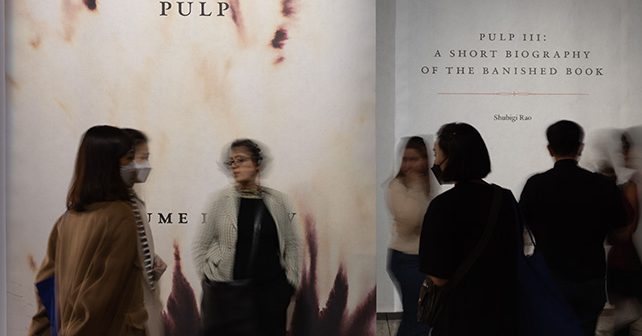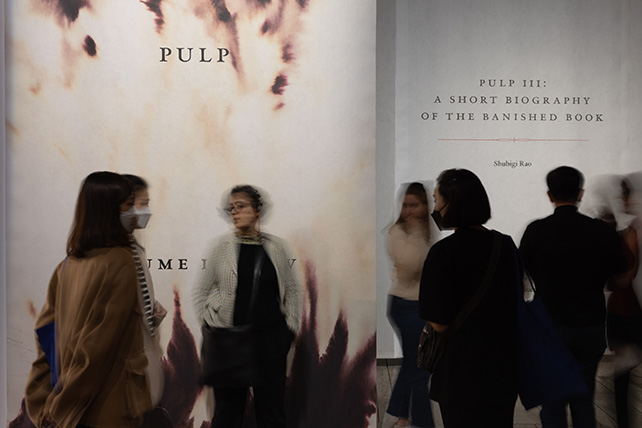

Shubigi Rao, Pulp III A Short Biography of the Banished Book, 2022. Installation view, Singapore Pavilion, 59th Internationa~ Arts Council, Singapore, curated by Ute Meta Bauer; exhibition design by Laura Miotto. Photograph by Alessandro Brasile
This year marks Singapore’s milestone 10th participation at the International Art Exhibition of La Biennale di Venezia (Biennale Arte). Conceived by Shubigi Rao and curated by Ute Meta Bauer, who together form the first-ever women-led team to represent Singapore at the Biennale Arte 2022, Pulp III: A Short Biography of the Banished Book is the first major international exhibition of Rao’s work that marks the midpoint of her ambitious ten-year project, Pulp.
Approaching the Pavilion entrance, one steps between what appears to be sheets of paper holding us within its folds, much like the enveloping that occurs in the act of reading. Entering the hanging paper maze, its layers unfold to reveal not only the architecture of a book, but also Shubigi Rao’s journey of discovery into the world of stories centred around books, for hundreds of chronicles are at the core of this work.
The next encounter is a multivocal filmic experience that explores, by way of personal confidences and poetic reflections, documentary and mytho-poetic languages, the tales of those at the frontlines of saving books and libraries. These people speak of smuggling volumes out of danger, preserving endangered languages and vanishing cultures, while sharing the sorrow of losing access to personal and collective pasts and histories.
Partially filmed in Venice, a city that embodies a vital history of print and open access, the film Talking Leaves depicts, among other stories, how books from a now-defunct archive of women partisans and genocide survivors, are rescued.
Discussions about the historical connections of access to knowledge and political power with Italian professor of book history Mario Infelise are interwoven with conversations with Singaporean researcher Faris Joraimi about the cultural politics and intellectual history of the Malay world. Venetian librarian Ilenia Maschietto shares stories of banned books and her favourite books of resistance, while Marco Borghi explains how alternative archives can act as safeguards of democracy. The poet Bianca Tarozzi invites us into her library sharing the books that survived the devastating 2019 floods in Venice. Singaporean writer Melissa de Silva reads aloud from a book of idioms in Kristang, an endangered language of Malacca’s and Singapore’s Eurasian communities. Retired librarian Saralee Turner recites passages from ‘Not Out of Hate’ by Myanmar writer Ma Ma Lay, while another describes the threats to contemporary libraries and free knowledge. Through these stories, we see the book as the embodiment of collective thought, labour, and readership, and we recognise the book as an intimate holder of humanity and community.
Copies of Rao’s new book, Pulp III: An Intimate Inventory of the Banished Book (Pulp Vol. III), are arranged in a way that speaks of the monumentality of its format as a container of knowledge. Pulp Vol. III chronicles Rao’s long-term artistic research process and conceptual reframing of the book and the library, whilst adding new research on Singapore and Venice as historic centres of print. Over the course of the Biennale Arte 2022, this installation of books will change in form as they are dispersed into the world. For Rao, each book is a messenger, a time-traveller, the embodiment of our need to communicate, and a rallying call to action.
Ute Meta Bauer, exhibition curator, commenting on the pavilion, said:
“Rao employs the book and the moving image as formats of communication which tend to the parts in the story that have often been deliberately obscured by those in power and by the expenses of capital. The artistic research is deeply interested in the ‘keepers’ of culture, of histories, of herstories, of identity, wherein language becomes a home and a place of retreat to protect and yet lament that which is lost. At a time when the world is experiencing great loss – not just in terms of the human lives lost to the pandemic but also the forms and ways of life lost to the climate crisis – the exhibition at the Pavilion fosters an appreciation for what it means to persist, to productively and meaningfully live together.”







